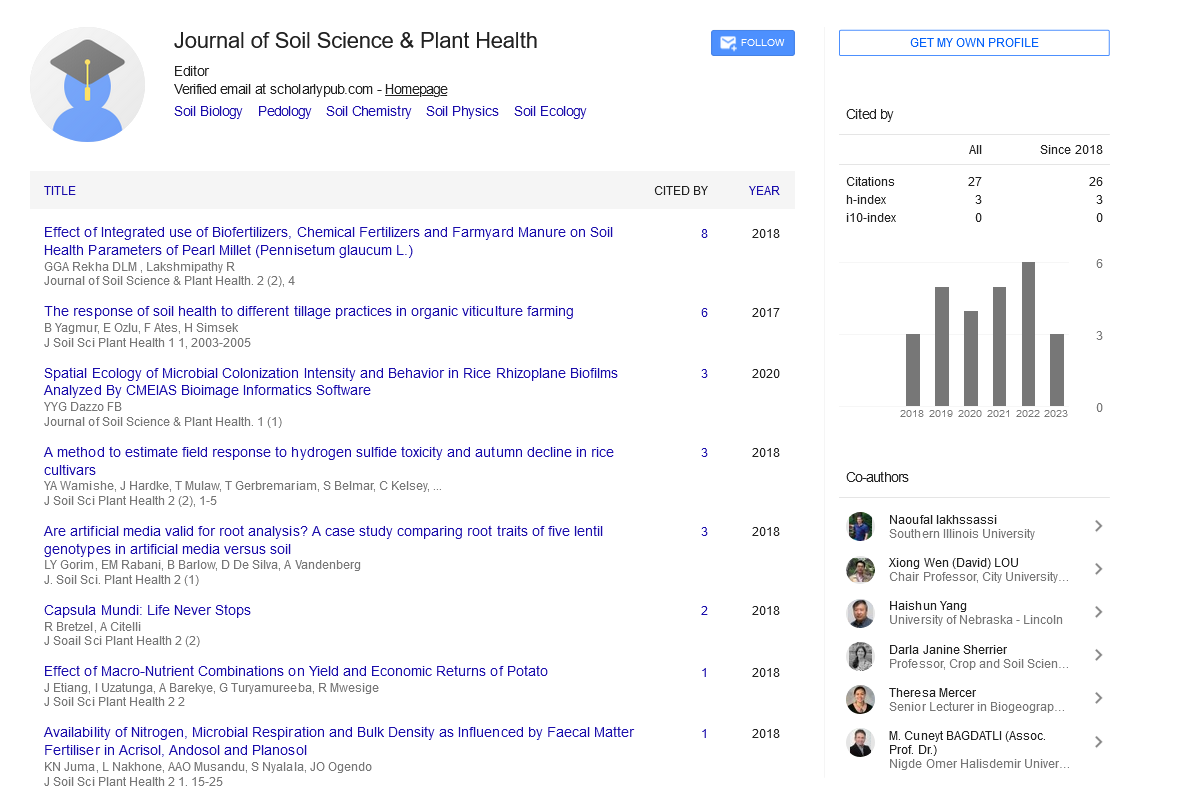Perspective, Vol: 7 Issue: 4
Soil Health and Sustainable Agriculture: The Role of Soil Biology
Cong Lu*
1Department of Microbial Ecology, Centre for Microbiology and Environmental Systems Science, University of Vienna, Vienna, Austria
*Corresponding Author: Cong Lu,
Department of Microbial Ecology, Centre for
Microbiology and Environmental Systems Science, University of Vienna, Vienna,
Austria
E-mail: cong.lu345@univie.ac.at
Received date: 31 July, 2023, Manuscript No. JSPH-23-113268;
Editor assigned date: 02 August, 2023, PreQC No. JSPH-23-113268 (PQ);
Reviewed date: 16 August, 2023, QC No. JSPH-23-113268;
Revised date: 23 August, 2023, Manuscript No. JSPH-23-113268 (R);
Published date: 30 August, 2023, DOI:10.4172/jsph.1000207
Citation: Lu C (2023) Soil Health and Sustainable Agriculture: The Role of Soil Biology. J Soil Sci Plant Nutr 7:4.
Description
In the pursuit of sustainable agriculture, one fundamental aspect often overlooked is the health of the soil. Soil health is the foundation upon which the entire agricultural ecosystem rests, and its significance cannot be overstated. Soil biology, encompassing the diverse and intricate web of microorganisms, insects, and other organisms residing in the soil, plays a pivotal role in maintaining and enhancing soil health. This essay explores the symbiotic relationship between soil health and sustainable agriculture, emphasizing the crucial role of soil biology in this intricate dance. Contrary to conventional wisdom, soil is not an inert substrate but a living, dynamic ecosystem. A teaspoon of healthy soil can contain billions of microorganisms representing thousands of species. This diverse community includes bacteria, fungi, archaea, protozoa, nematodes, earthworms, and various insects, each contributing to the complex tapestry of soil biology.
One of the most critical functions of these soil organisms is nutrient cycling. Microbes, particularly bacteria and fungi, break down organic matter and convert it into essential nutrients that plants can absorb. Nitrogen-fixing bacteria convert atmospheric nitrogen into a form that plants can use. Mycorrhizal fungi form symbiotic relationships with plant roots, facilitating nutrient uptake in exchange for carbon compounds from the plant. This nutrient cycling ensures a continuous supply of vital elements, promoting plant growth and productivity.
Soil biology also plays a significant role in improving soil structure. Earthworms, for example, burrow through the soil, creating channels that improve aeration and water infiltration. These activities enhance the porosity of the soil, allowing roots to penetrate deeper and access nutrients and water more effectively. In turn, healthy soil structure reduces erosion and enhances soil's ability to retain moisture, which is particularly crucial in drought-prone regions.
Certain soil organisms act as natural allies in pest management. For instance, entomopathogenic nematodes are parasitic organisms that target insect pests, providing a biological control mechanism. Likewise, some fungi, like Trichoderma and Beauveria, can suppress plant pathogens. Harnessing these natural biological controls reduces the need for synthetic pesticides, aligning with the principles of sustainable agriculture and minimizing harm to non-target organisms.
Soil biology is also intricately linked to carbon sequestration and climate change mitigation. Healthy soils rich in organic matter store significant amounts of carbon. Through processes like photosynthesis, plants take in carbon dioxide from the atmosphere and convert it into organic matter, which then becomes part of the soil's organic carbon pool. Microbes play a vital role in breaking down organic matter, which, when combined with stable organic matter (humus), forms a long-term carbon store in the soil.
Increasing the organic carbon content of soils not only helps mitigate the effects of climate change by removing carbon dioxide from the atmosphere but also improves soil fertility and water retention. Sustainable agriculture practices that focus on enhancing soil biology and increasing organic matter content can thus contribute to a more stable climate and resilient agricultural systems. Despite the critical role of soil biology, modern agricultural practices have often been detrimental to soil health. Intensive tillage disrupts soil structure and can harm soil organisms, particularly those residing near the surface.
The heavy use of synthetic fertilizers and pesticides can disrupt the delicate balance of soil microbial communities, leading to imbalances in nutrient cycling and pest control. Monoculture cropping systems, common in modern agriculture, can also deplete specific nutrients in the soil while promoting the proliferation of certain pests and diseases. This not only reduces soil biodiversity but also requires increased reliance on synthetic inputs, perpetuating a cycle of soil degradation. Soil health and sustainable agriculture are intricately linked, with soil biology serving as a linchpin in this relationship.
Recognizing the soil as a living ecosystem, nurturing its diversity, and implementing sustainable agricultural practices that prioritize soil biology are essential steps toward ensuring the long-term health and productivity of our agricultural systems. As we confront the challenges of feeding a growing global population while mitigating climate change and preserving biodiversity, a shift toward sustainable agriculture practices that embrace soil biology becomes not just a choice but a necessity. By safeguarding the health of our soils and the intricate web of life within them, we can cultivate a more resilient and sustainable agricultural future for generations to come.
 Spanish
Spanish  Chinese
Chinese  Russian
Russian  German
German  French
French  Japanese
Japanese  Portuguese
Portuguese  Hindi
Hindi 